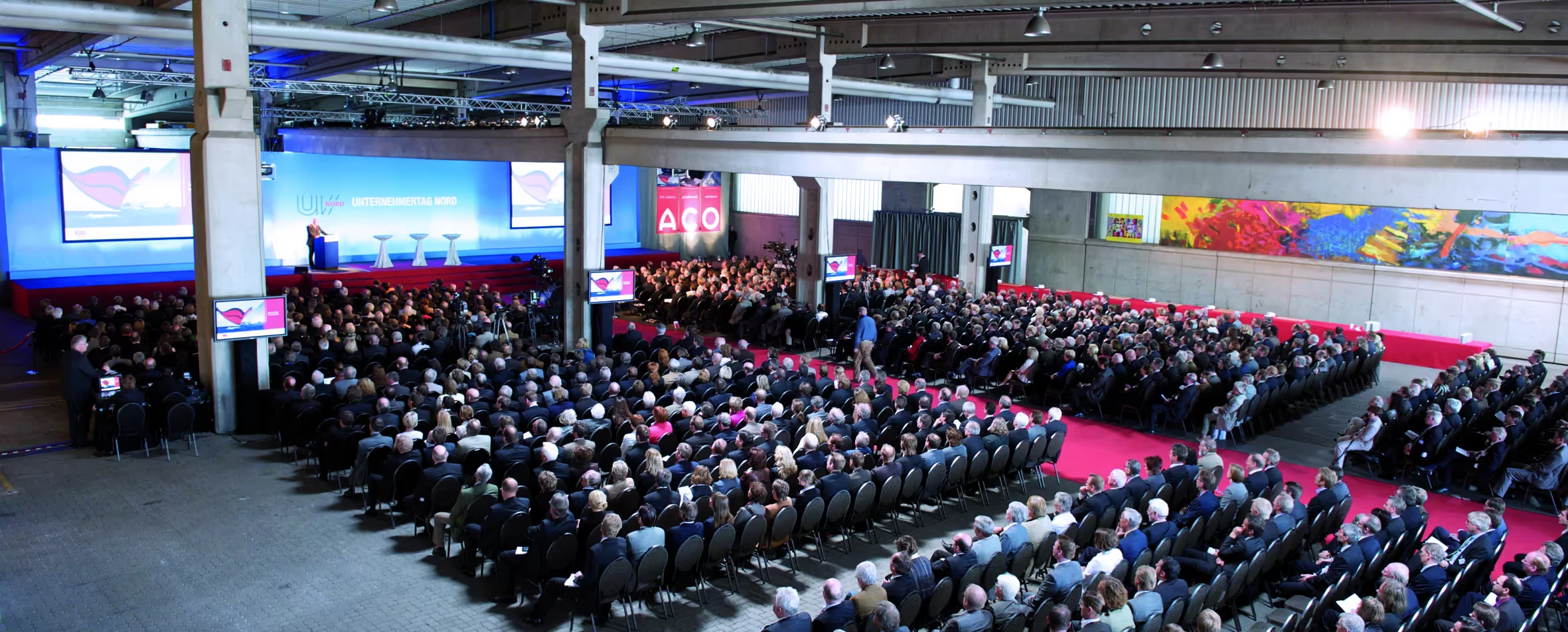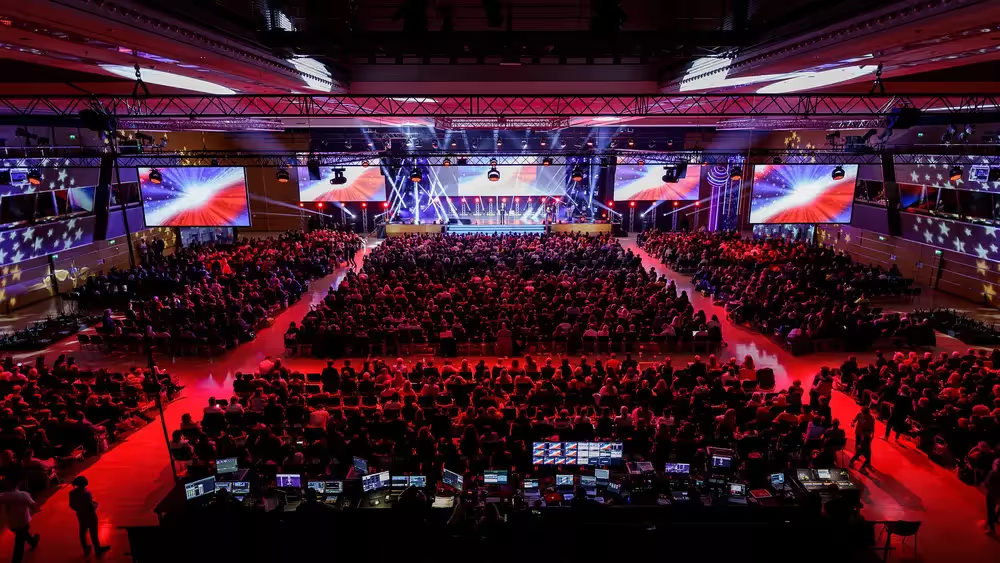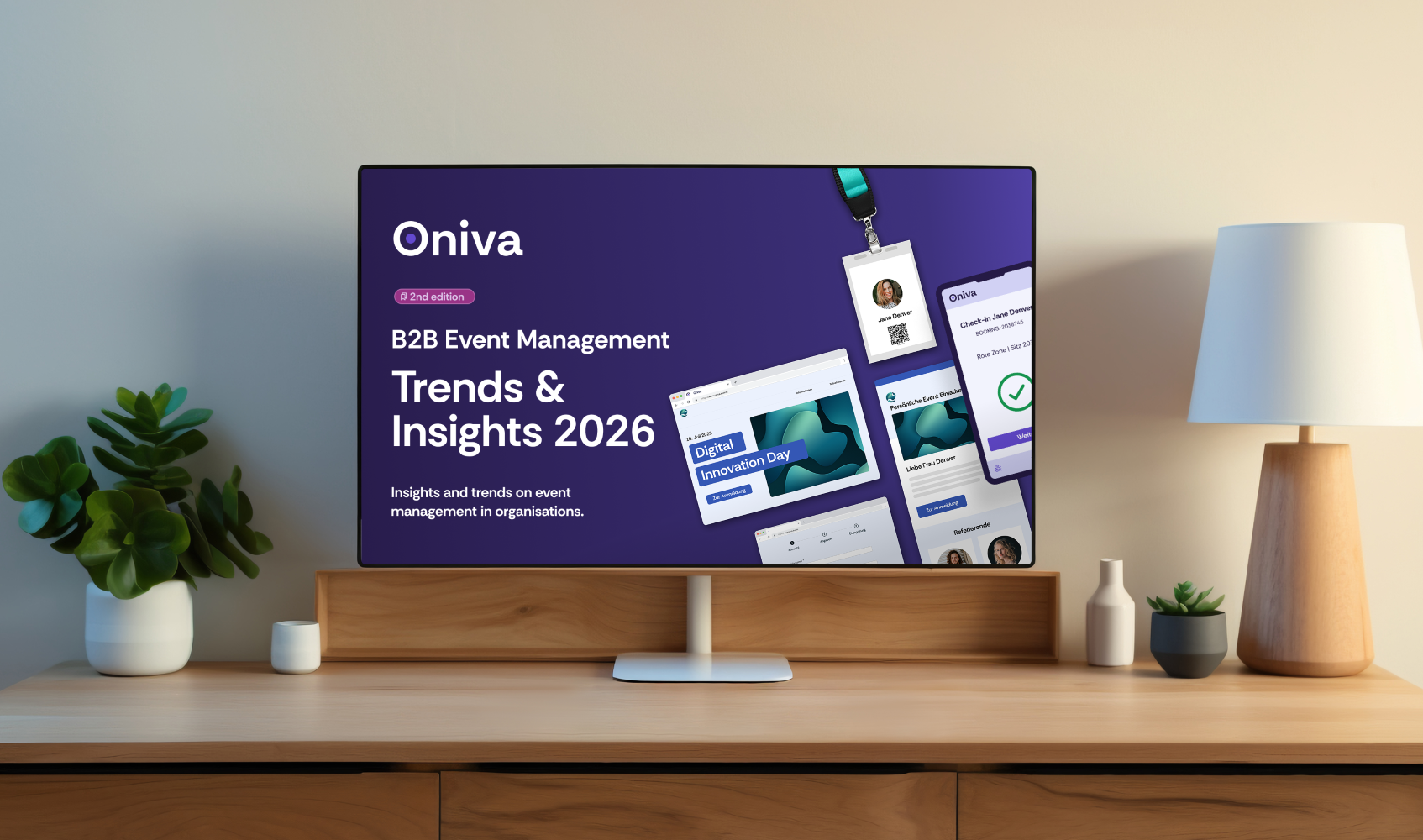What is event ticketing?
Event ticketing refers to the process of selling tickets for an event. This process includes setting the ticket price, choosing sales channels, and managing guest data. Event ticketing is an essential part of event planning, as it not only helps cover costs but also manages attendance numbers and maintains event quality.
Which Business Events Are Suitable for Ticket Sales?
Selling tickets is worthwhile whenever your event offers real value, such as knowledge, contacts, or access to exclusive content. This is especially true for formats that go beyond mere networking.
- Professional conferences and congresses: Participants expect high-quality content, well-known speakers, and a curated programme. A ticket price emphasises the professional standard and helps filter the target audience.
- Workshops and training sessions: When your event provides practical expertise, participants are willing to pay for the knowledge, particularly for small groups with limited spaces.
- Industry meet-ups and summits: These formats often focus on access to key decision-makers. The price reflects the exclusive nature of the event.
- Hybrid and online events: Digital formats can also be paid, for example if you offer high-quality content or extended access (e.g., on-demand tickets).
Ticket sales are generally not suitable for pure networking events or community gatherings without clear content, where the benefit is difficult to quantify. In such cases, you can instead fund the event through sponsorship or partnerships.
Paid tickets for business events – why business events can have a cost
Business events are valuable opportunities for companies and professionals to network, exchange knowledge, and explore new business opportunities. According to a recent survey, marketing budgets at B2B companies decreased by 3.1% from 2024 to 2025. Paid B2B events can help alleviate marketing budget pressures. Charging for event tickets also contributes to ensuring the quality and success of events, from financing top-tier content to securing premium venues. Whether your event is free or paid naturally depends on your goals and event concept. In any case, there are solid reasons to charge ticket prices for B2B events.
1. Increase the exclusivity of the event
Paid tickets raise the perceived value of the event and create a sense of exclusivity. Participants who are willing to pay are often more engaged and contribute to a high-quality event atmosphere.
2. Reduce compliance hurdles
Collecting attendance fees can lower compliance barriers, particularly for participants from regulated industries who may be restricted from accepting free offerings.
3. Refinance high-quality event content
Revenue from ticket sales allows the financing of premium content and speakers. High-level presentations and workshops are costly and require adequate funding.
4. Reduce the no-show rate
Paid events generally have a lower no-show rate. Participants who have paid for a ticket feel a stronger commitment to attend.
5. Preferred conditions for key clients
Paid events offer the opportunity to provide preferential conditions for important clients or partners, such as discounts or exclusive access.
6. Ensure high-quality venues
Ticket sales enable booking premium venues that provide a comfortable and professional environment, significantly contributing to the overall event quality.
7. Better resources for marketing and promotion
Revenue from ticket sales can fund effective marketing and promotional strategies to increase awareness and attractiveness of the event.
8. Enhanced guest services
Fees allow organisers to offer additional services such as comprehensive event documentation, goodies, access to exclusive workshops, or follow-up materials, increasing the value for participants.
Pricing strategies
How should the ticket price be set?
The ticket price affects how your event is perceived. A price that is too low can make the event seem cheap or generic, while a price that is too high may deter potential participants. What matters is how you justify and communicate the price. In a B2B context, transparency is key, as participants want to know exactly what they are getting for their money.
Setting ticket prices for business events requires analysis and strategic planning. You can base your pricing strategy on the following approaches:
1. Supply and demand
The ticket price should reflect the demand for the event. Highly sought-after events with limited spaces can justify higher prices, whereas lower-demand events may benefit from lower prices to encourage participation.
2. Comparison with similar events
Benchmarking against comparable events can provide valuable insights into appropriate pricing. It is important to consider the prices in the context of the content and services offered to remain competitive while enhancing the perceived value of your event.
3. Willingness to pay in your target audience
The target audience’s willingness to pay plays a crucial role in setting prices. Surveys and direct feedback can help organisers gauge how much potential participants are willing to pay without feeling discouraged. For example, you can survey your audience on social media to get initial insights.
4. Cost coverage
Calculate your ticket price to cover location, catering, technical equipment, and personnel costs. Divide the total cost of the event by the expected number of participants to determine the ticket price per guest. Remember to factor in any payment processing fees.
Another important consideration is VAT. This blog post discusses in detail which VAT rates apply to B2B events in Germany, Austria, and Switzerland.
Which pricing strategies are suitable for B2B events?
Several proven models can be applied depending on the event type:
- Early-Bird Tickets: Offer lower prices for early bookings. This provides planning security and accelerates ticket sales.
- Standard and Last-Minute Pricing: After the early-bird phase, the regular price applies. Late bookings pay a premium, creating scarcity.
- Group or Team Tickets: Ideal for companies sending multiple employees. This increases bookings per company.
- VIP or Premium Tickets: Offer exclusive benefits such as access to the speaker lounge, better seating, or networking dinners.
- Content Access: Sell additional digital tickets to make sessions available on-demand or provide other content like e-books from speakers. This allows you to monetise your event even after it has taken place.
The strategy you choose depends on your goal. Do you want to quickly reach a base attendance? Then use early-bird pricing. Do you want to increase revenue per ticket? Then offer premium options.
When should each pricing strategy be applied?
A predefined timeline provides structure and boosts ticket sales. Use the following phases as guidance:
Early Phase (6–9 months before the event)
- Launch early-bird tickets.
- Communicate a fixed end date or a limited quota.
- Use the discounted price as a hook for the event launch.
Middle Phase (2–6 months before the event)
- Switch to the standard price.
- Increase visibility with targeted campaigns and highlight key content (e.g., speaker announcements).
- Offer group pricing to encourage company bookings.
Final Phase (1 month to a few days before the event)
- Depending on demand so far, increase the price or offer discounted last-minute tickets.
- Always communicate clearly: “Only a few places left.”
- Use premium tickets to convince late bookers with added value.
Following this phased approach allows you to manage demand for your B2B event throughout the entire period. It keeps ticket sales active and avoids long periods with little movement.
Payment methods for B2B events
Which payment methods are suitable for B2B events?
For paid B2B events, payments are generally handled via either invoice payment or online payment. Cash payments are uncommon for B2B events, as companies usually do not operate physical ticket offices. Since ticket prices for B2B events are often higher than, for example, concert tickets, choosing the right payment method is crucial to the success of ticket sales.
How should the payment method for B2B event tickets be selected?
A smooth payment process is an important part of the customer experience. When selecting a payment method, the following questions should be considered:
- Who is the target audience of the event?
- Which payment methods are established within the target audience?
- How high is the ticket price?
- Could the ticket price exceed typical credit card limits?
- Who bears the risk for ticket revenue? In the event of a payment default, can ticket revenue be foregone without affecting the success of the event?
- Is event check-in allowed without a completed invoice payment?
- What administrative effort is required to process ticket revenue?
Choosing the right payment methods affects not only participant satisfaction but also registration rates and the administrative workload for event organisers.
What are the advantages of online payment compared to invoice payment for B2B event tickets?
1. Fast processing
Online payments are processed immediately, and receipt of payment is instantly confirmed. This reduces administrative work for accounting and provides planning security for event organisers.
2. Fewer payment defaults
Invoice payments carry the risk of late or non-payment, which can be frustrating, especially after the event has occurred. Online payments eliminate this risk, as the amount is paid in advance.
3. Automated ticket delivery
Online payments allow ticket distribution to be automated. After successful payment, tickets can be sent immediately without manual verification.
4. Global reach
Online payment methods such as Visa and Mastercard make it easier for international participants to purchase tickets. Credit cards are widely accepted, making the process more convenient for everyone involved.
What are the disadvantages of online payment compared to invoice payment for B2B event tickets?
1. Transaction fees
Online payments incur fees, which must either be absorbed by the organiser or passed on to participants.
2. Limited acceptance in some companies
Some companies prefer invoice payments for accounting reasons. Especially for larger amounts, participants may not wish to use a credit card or mobile payment solution.
Why is combining invoice and online payment for B2B event tickets not recommended?
At first glance, offering both online payment and invoice payment may seem attractive, but it comes with several challenges:
1. Complex administrative effort
Managing two different payment methods doubles the workload for accounting, customer service, and ticket processing, increasing the risk of errors and delays.
2. Liquidity risk
Invoice payments carry the risk of defaults or delayed payments, which can jeopardise the event’s financial planning and create additional administrative work.
3. Delayed ticket processing
For invoice payments, tickets usually need to be manually released; otherwise, participants could access the event without having paid.
Conclusion
A well-planned event ticketing strategy directly contributes to the success of your business event. The right price creates value, the appropriate strategy ensures strong attendance, and the suitable payment method minimises effort and risk. By planning ticketing strategically, you secure engaged participants, stable revenue, and an event that feels professional—from booking to check-in.



















.svg)















































































